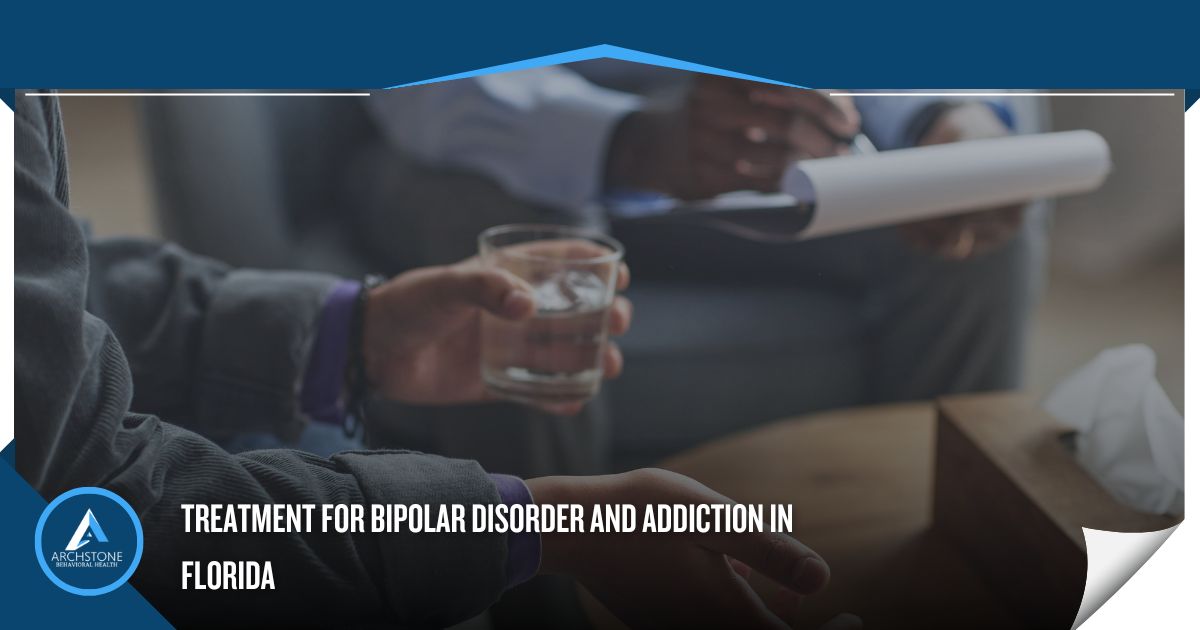Treatment for Bipolar Disorder and Addiction in Florida
Get Help Now
Addiction affects millions of Americans every year. According to the Substance Abuse and Mental Health Services Administration (SAMHSA), 48.7 million people had a substance use disorder in 2022.[1]
While many risk factors contribute to the development of addiction, mental health has a huge impact. Many people who struggle with substance abuse have underlying mental health conditions. If you have an addiction and a mental illness, this is known as having co-occurring disorders.
One of the most common conditions to co-occur with addiction is bipolar disorder. Bipolar disorder is a mental illness that causes mood swings and episodes of mania and depression. It is common for people with bipolar disorder to begin abusing drugs or alcohol to cope with their symptoms.
When you have bipolar disorder and addiction, rehab centers treat these conditions simultaneously. Bipolar disorder and addiction treatment in Florida combines mental health and addiction recovery techniques. As a result, clients can achieve long-lasting recovery from both of their illnesses.
The Connection Between Bipolar Disorder and Addiction
People with bipolar disorder deal with manic and depressive episodes. During manic episodes, people might experience increased energy, impulsive behavior, and a lessened need for sleep. On the other hand, depressive episodes cause low energy and a lack of interest in activities. People might also experience thoughts of suicide.
The symptoms of bipolar disorder make it difficult for people to cope with everyday life. As a result, they may begin abusing drugs or alcohol to lessen their symptoms. While this might provide short-term relief, it often leads to addiction.
The prevalence of addiction among people with bipolar disorder is at least 40%.[2] Since substance abuse is so common, access to bipolar disorder and addiction treatment centers is vital.
How are Bipolar Disorder and Addiction Treated in Florida?
Treating bipolar disorder and addiction can be complicated. The effects of bipolar disorder often exacerbate addictive behavior. However, addiction and bipolar disorder treatment centers specialize in helping clients achieve recovery.
Bipolar disorder and addiction are treated in Florida using individualized treatment plans. The services you participate in are based on your specific needs.
During a bipolar disorder and addiction treatment program, you can expect:
Assessment and Diagnosis
The first step in treatment is always an initial assessment. The medical team will ask you questions about your physical and mental health as well as your history of substance abuse. Staff members then create an individualized treatment plan.
Additionally, mental health experts will assess you to ensure bipolar disorder is the correct diagnosis. As a result, your treatment center will know what medications and therapies will work best for you.
Medical Detox
Next, you will participate in medical detox. The goal of detox is to ensure the drugs or alcohol leave your body safely and comfortably. Doctors prescribe medications to prevent your withdrawal symptoms from being severe.
In addition, nurses and doctors will monitor your vital signs. If any issues arise, medical professionals will be able to address them promptly. In other words, medical detox keeps you safe during withdrawal.
Medication Management
Chemical imbalances in the brain characterize bipolar disorder. Due to this, psychiatrists might prescribe you a medication. Typically, doctors prescribe mood stabilizers or antipsychotics to control the symptoms of bipolar disorder.
Common medications used to treat bipolar disorder include:
- Seroquel
- Zyprexa
- Risperdal
- Lithium
- Lamictal
- Depakote
- Tegretol
Evidence-Based Therapies
You will engage in both Individual counseling and group therapy to recover from addiction and bipolar disorder. The most common treatment used to treat these conditions is cognitive behavioral therapy (CBT). CBT is effective in changing negative patterns of behavior and offering positive coping mechanisms.
All of the therapies used are evidence-based, which means they are proven effective in treating bipolar and addiction. You might also participate in therapy with your family members, as these conditions can cause strained relationships.
Relapse Prevention and Aftercare
You will learn how to prevent relapses before you complete treatment. Typically, this involves learning common triggers and developing healthy coping mechanisms. Your therapist might also help you create a plan of action in case a relapse occurs.
In addition, your treatment center will offer you aftercare services to engage in after you complete rehab. These may include:
- Continued therapy
- Medication management
- Referrals to outpatient rehab or sober living homes
- Recommendations on local support groups
- Access to an alumni program
- Case management services like vocational training
Find Treatment for Bipolar Disorder and Addiction in Florida
Dual-diagnosis rehab centers will help you recover from co-occurring bipolar disorder and addiction. At Archstone Behavioral Health, we pride ourselves on offering our clients comprehensive recovery services. Our mental health and addiction treatment experts can offer you the support you need to regain control over your life.
Contact us today to learn more about our bipolar disorder and addiction treatment center in Florida.
References:
- The Substance Abuse and Mental Health Services Administration (SAMHSA): HHS, SAMHSA Release 2022 National Survey on Drug Use and Health Data, Retrieved January 2024 From https://www.samhsa.gov/newsroom/press-announcements/20231113/hhs-samhsa-release-2022-nsduh-data
- The National Library of Medicine (NLM): The prevalence and significance of substance use disorders in bipolar type I and II disorder, Retrieved January 2024 From https://www.ncbi.nlm.nih.gov/pmc/articles/PMC2094705/
